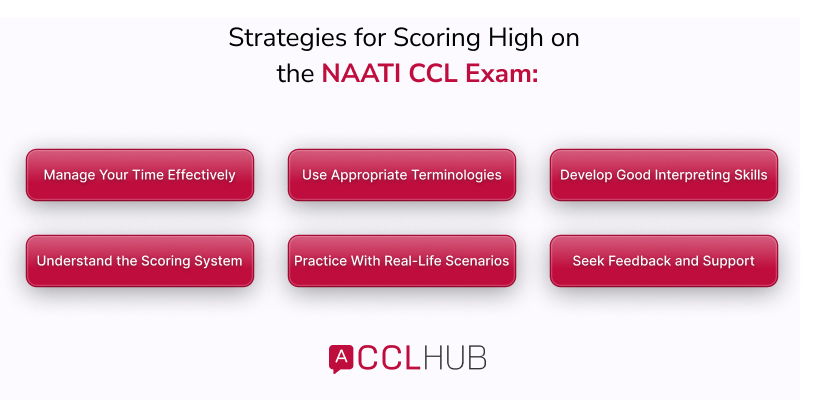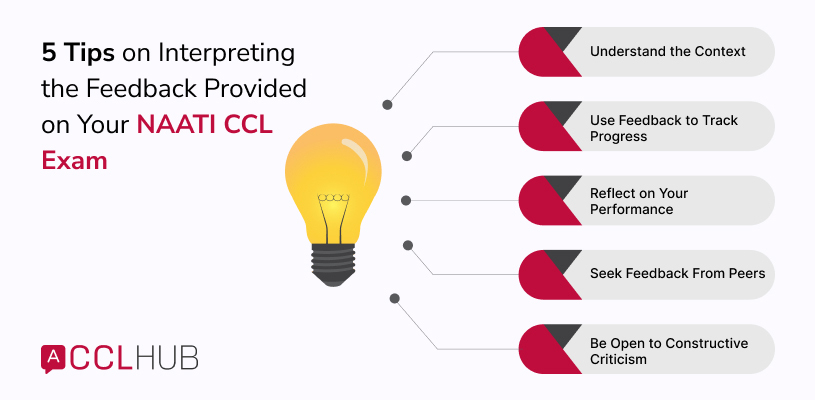
Maximize your Points: Strategies for Scoring High on NAATI CCL Exam
Are you planning to apply for an Australian Permanent Residency (PR) and looking for ways to earn extra points? One way to do so is by obtaining a certification from the National Accreditation Authority for Translators and Interpreters (NAATI). However, you need solid strategies for scoring high on the NAATI CCL exam.
NAATI certification holds high value because it can add five extra points to your PR application, making it a valuable investment for your future in Australia.
Furthermore, Scoring high on the NAATI CCL exam requires a combination of language proficiency, interpreting skills, and exam strategies. Hence, this blog discusses strategies to help you maximize your points on the NAATI CCL exam.
📑 Editors Recommended: Here’s How to Pass NAATI CCL exam on the First Attempt
Understanding the NAATI CCL Exam Scoring System
Understanding the NAATI CCL exam scoring system is crucial for effective preparation and success on the exam. It helps candidates identify their strengths and weaknesses and focus on areas that need improvement.
Initially, the NAATI CCL exam has two parts: interpreting and translation. Each part is worth a maximum of 45 points, with a minimum of 29 points required to pass each part.
For interpreting, candidates need to listen to short dialogues or monologues in two languages and interpret them in the other language. The dialogues or monologues are related to everyday situations, such as booking a hotel or ordering food at a restaurant.
Candidates receive marks and scores according to their accuracy, fluency, and appropriateness of language use. Additionally, In the translation part, candidates need to translate short written texts from one language to another.
The texts are related to general topics, such as news articles or personal letters. However, candidates must score at least 63 out of 90 points (70% or higher) to pass the exam.
By understanding the scoring system and focusing on the exam criteria, candidates can maximize their chances of success and achieve their desired NAATI CCL certification.
Strategies for Scoring High on the NAATI CCL Exam

Preparing for the NAATI CCL exam can be daunting, especially if you’re unfamiliar with the exam format or scoring system. However, with the right strategies and techniques, you can maximize your chances of success and achieve your desired NAATI CCL certification.
So, let’s dive in and explore the strategies for scoring high on the NAATI CCL exam!
1. Manage Your Time Effectively
Time management for the NAATI CCL exam is very crucial for scoring high marks. You will have limited time to interpret the conversation or monologue, and it is essential to manage your time effectively.
Moreover, you can divide your time wisely between listening, analyzing, and interpreting the dialogue or monologue. You can also practice your time management skills by taking practice tests and mock exams.
Once you know the time allocated for each section, prioritize tasks based on their complexity and importance. Start with the questions you find most accessible or with the most marks.
By tackling these questions first, you build momentum and confidence, which can help you manage your time more effectively throughout the exam.
2. Use Appropriate Terminologies
Ensure you are familiar with the technical terms and jargon used in your chosen language and the subject matter of the dialogue or monologue. This will help you convey the message accurately and effectively.
Using appropriate terminology in your interpretation can help you score higher on the NAATI CCL test. Sure thing! Let’s break down the use of appropriate terminologies for the NAATI CCL exam in simpler terms.
Moving on, “consecutive interpreting” might sound fancy, but it’s like a relay race of words. You listen to someone talking, take a mental note, and then share it in another language. Practice this skill to ensure your relay is smooth, like passing the baton without dropping it.
Moreover, you jump in when two people speak different languages, and your job is to ensure they understand each other. It’s a bit like being the language bridge in a friendly conversation.
In terms of “ethical standards,” think of it as being a language superhero with a code of conduct. You keep things confidential, stay neutral, and always act like a pro. It’s about being trustworthy with the linguistic superpowers you have.
By doing this, you’ll be on your way to conquering the NAATI CCL exam.
3. Develop Good Interpreting Skills
Interpreting skills play a vital role in the NAATI CCL exam. You need to be able to listen, analyze, and interpret the conversation or monologue accurately and fluently.
Developing good interpreting skills requires practice and feedback. Also, you can practice your interpreting skills by taking NAATI CCL mock exams, attending workshops, and seeking feedback from experienced interpreters.
Also, actively engage with the speaker, eliminate distractions, and make listening a fine-tuned skill.
Moving on, think of Vocabulary Boost as constructing a sturdy bridge between languages. Like building blocks, your vocabulary needs to be solid. Work on expanding your word arsenal, especially in health, education, and daily life.
The more diverse your vocabulary, the smoother your interpreting journey becomes.
Furthermore, let’s talk about Thinking on Your Feet – like being a verbal gymnast. In interpreting, you can’t afford to fumble. Practice spontaneous interpretation by tackling various texts or engaging in impromptu conversations.
This hones your ability to respond swiftly and accurately, a crucial skill for the dynamic nature of the exam.
4. Understand the Scoring System
Understanding the scoring system of the NAATI CCL exam can help you focus on the areas where you need to improve. The exam is scored on a scale of 0 to 45; you must score at least 29 points to pass.
The higher your score, the more points you can earn for your PR application. Now, let’s break down understanding the scoring system for the NAATI CCL exam clearly and straightforwardly.
Firstly, think of the scoring system as a roadmap guiding your journey. The examiners assess your performance based on key criteria. These include Accuracy, where you must hit the bullseye in conveying the message without losing its essence.
Your interpretations should align with the original meaning.
Next up is Fluency, like the flow of a river. Your responses should glide smoothly without stumbling. Maintaining a steady and fluent delivery is crucial even if you encounter a challenging word or concept.
Lastly, think of Cohesion as the glue holding everything together. Your responses should form a cohesive narrative. Each interpreted segment should seamlessly connect, creating a clear and logical thread.
5. Practice With Real-Life Scenarios
Practicing in a real-life scenario is one way to prepare for the NAATI CCL exam. You can find online practice materials and mock exams from CCLHUB that simulate real-life conversations and monologues.
Furthermore, this can help you develop your interpreting skills and prepare for the exam format.
Moreover, consider job-specific scenarios. If you’re preparing for health-related topics, pretend you’re in a clinic, interpreting a patient’s concerns. For education, imagine yourself in a parent-teacher interview.
This hands-on practice helps you get comfortable with the vocabulary and nuances of different domains.
Lastly, reflect on your experiences. After each practice scenario, consider what went well and what you can improve. It’s like being your language coach. Recognize your strengths, work on areas needing improvement, and refine your skills.
This way, you’ll be better prepared to handle the real-life language challenges the NAATI CCL exam might throw at you. Good luck with your language adventure!
6. Seek Feedback and Support
One of the most effective ways to improve your performance on the NAATI CCL exam is to seek feedback and support from experienced language professionals or NAATI CCL exam coaches. One of which is CCLHUB.
Moreover, you can seek feedback from your peers, tutors, or language exchange partners to help you identify your strengths and weaknesses. You can also join online forums and groups to discuss the exam with other candidates and get advice from those who have already taken the exam.
Also, share your practice sessions with someone you trust, a friend, a family member, or a fellow language explorer. Let them listen to your interpretations and provide feedback. It’s like having a co-pilot on your language journey.
Consider joining a language support group. It’s like being part of a team. Connect with others preparing for the same exam. Share tips, tricks, and experiences. It’s not just about learning from books; it’s about learning from each other’s language adventures.
Be bold and ask for constructive criticism. It’s like getting a treasure map to improve. Seek specific feedback on areas you want to enhance, whether pronunciation, vocabulary, or cultural nuances. This feedback is gold on your language quest.
💡Learn more: How to Get Filipino NAATI CCL Course Packages Online?
5 Tips on Interpreting the Feedback Provided on Your NAATI CCL Exam

NAATI CCL test candidates must identify areas where they need improvement and develop strategies to improve them further. Hence, the following are five tips for interpreting the feedback provided on your NAATI CCL exam.
1. Understand the Context
The feedback provided by NAATI CCL examiners may be context-specific, meaning it may not apply to all situations. For example, if the feedback relates to your interpretation skills, it may not apply to your translation skills.
Therefore, it’s essential to understand the context in which the feedback was provided to avoid misinterpreting it and focus on improving the specific skills that are important for the exam.
In the realm of the NAATI CCL Exam, context is not just about words; it extends to the broader cultural and situational aspects. It’s about grasping the environment in which the conversation or text occurs.
Likewise, interpreting is about capturing the right tone, mood, and nuances. For instance, interpreting a medical conversation requires a different tone than interpreting a casual chat among friends.
Moreover, consider context as the backdrop against which your language skills shine. It’s like being on a stage – the context sets the scene, and your interpretation becomes the performance.
A clear understanding of the context ensures your performance aligns with the expectations and requirements of the given situation.
2. Use Feedback to Track Progress
Test candidates can review your previous exam score reports to see how you have improved and identify areas you still need to focus.
Use the feedback provided by the examiners to track your progress over time. This can help you clearly understand your strengths and weaknesses and make informed decisions about your study strategies.
Also, regularly assessing the feedback you receive is like looking into this mirror to see how you’ve evolved. It’s not just about what you see but about understanding what adjustments you can make to refine your interpreting abilities further.
Each piece of advice is a marker, indicating areas where you excel and aspects that demand attention. It’s akin to planting flags along the way, signifying progress, and highlighting areas for further exploration in your language journey.
Consider feedback as a dynamic tool, not a static evaluation. It’s like checking the weather forecast before embarking on a trip – it helps you adapt and prepare for the challenges ahead. Regularly incorporating feedback into your practice sessions allows you to fine-tune your skills, ensuring continual progress.
3. Reflect on Your Performance
Take time to reflect on your performance after each exam. Consider what you did well, what you struggled with, and how you can improve in the future.
Think of reflection as a mental rewind button. Picture yourself in the scenarios you practiced – interpreting a medical conversation, facilitating a parent-teacher meeting, or engaging in a casual dialogue. Reflect on how you approached each situation, identifying the moments where your linguistic dance was in perfect sync and recognizing areas that might benefit from a smoother transition.
Also, consider reflection as a dialogue with yourself. It’s like having a conversation with your interpreting self in the mirror. Ask questions. What worked well? Where did you stumble?
This internal dialogue helps you delve deeper into your performance, fostering self-awareness and paving the way for targeted improvements.
Reflect on your performance as an ongoing process, not a one-time event. It’s like tending to a garden. Regularly assess your interpretive skills, noting the blooms of success and identifying the weeds that need pulling.
However, this consistent reflection allows for continuous growth and refinement in your linguistic abilities.
4. Seek Feedback From Peers
Seeking feedback from peers who have taken the NAATI CCL exam can provide you with valuable insights into how to interpret the feedback provided by examiners. They can share their experiences with you and guide you in improving your performance.
Inviting feedback from your peers in preparation for the NAATI CCL Exam is akin to having fellow explorers on your language journey. It’s not just about embarking on the expedition alone; it’s about having companions who can share insights and help you navigate the linguistic terrain.
Also, consider seeking peer feedback as building a language community.
Engage with others who are also preparing for the exam. Share your practice sessions, interpret each other’s performances, and exchange constructive feedback. It’s like having a group of fellow travelers, each contributing unique perspectives to enrich the collective learning experience.
Think of seeking feedback from peers as a two-way street. It’s not just about receiving insights; it’s also about giving constructive feedback to others. This mutual exchange fosters a supportive environment where everyone benefits from each other’s strengths and areas of improvement. It’s like co-navigating the language journey and learning together.
Reflect on seeking feedback from peers as a process of collaborative growth. It’s like cultivating a shared garden of language skills. As you provide and receive feedback, the collective knowledge and proficiency of the group evolve.
5. Be Open to Constructive Criticism
It’s essential to be open to constructive criticism when interpreting the feedback provided on your exam. Use the feedback as an opportunity to learn and improve your skills.
Furthermore, keep an open mind, ask questions to clarify any areas of uncertainty, and use the feedback to develop a clear action plan for improving your performance on future exams.
Being open to constructive criticism in your NAATI CCL Exam preparation is akin to having a compass that guides you toward improvement. It’s not about being flawless; it’s about recognizing areas where you can refine your skills and embracing feedback as a valuable tool for enhancement.
Think of openness to constructive criticism as a bridge to progress. When you receive feedback, consider it as a pathway to cross over from your current proficiency level to an even more refined one. It’s like constructing a sturdy bridge of skills, with each piece of criticism contributing to its strength.
Consider being open to constructive criticism as a mindset shift. It’s not about taking feedback personally but viewing it as an opportunity for growth. This shift in perspective is like adjusting your sails to catch the winds of improvement, propelling you forward in your language journey.
How to Access NAATI CCL Exam Practice Materials
The NAATI CCL exam is a challenging test, and it’s crucial to have access to reliable study materials and NAATI CCL mock tests to prepare adequately. Also, the study materials and practice tests can help you better understand the exam format and the language skills required to pass the exam.
To make your exam preparations easy, CCLHUB is an online portal that provides access to high-quality NAATI CCL study materials, mock tests, and tutors to help students pass the NAATI CCL exam. The portal offers a range of courses in 21 languages other than English.
Furthermore, accessing materials at CCLHUB allows you to study at your own pace and receive personalized support from experienced tutors. The portal provides access to practice tests that simulate the actual exam, providing one-on-one classes with the tutor and allowing you to test your skills and identify areas for improvement.
In summary, accessing high-quality study materials, practice tests, and tutors is essential for your NAATI CCL exam success. CCLHUB provides a convenient and comprehensive online platform for exam takers to access these resources and prepare themselves to pass the exam with flying colors.
🔔 Don’t Miss: NAATI CCL Test Updates and Validity
Conclusion
In conclusion, passing the NAATI CCL exam is essential for individuals looking to achieve 5 Australian PR points. The exam’s scoring system can be challenging to understand, and interpreting feedback can be equally tricky.
However, by following the strategies for scoring high on the NAATI CCL Exam outlined in this blog, you can significantly increase your chances of success on the exam. Also, CCLHUB can be a perfect learning portal to access NAATI CCL course materials for your own benefit.
Preparing for the NAATI CCL exam requires effort, dedication, and a willingness to learn. Still, with the right tips for NAATI CCL, and study resources from CCLHUB, you can successfully score high on the exam and achieve your goals of Australian permanent residency.
FAQ
Passing the NAATI CCL Exam can give you 5 points towards your Australian Permanent Residency (PR) application.
Some strategies for scoring high on the NAATI CCL Exam include practicing regularly, building vocabulary, developing listening skills, using appropriate tone and register, and being aware of time management.
CCLHUB is an online portal that offers various course materials, mock tests, and tutors to help you prepare for the NAATI CCL Exam. It can provide you with valuable resources and support to improve your chances of success.
You can seek feedback and support from various sources, such as your NAATI CCL tutor, study group, or online forums. You can also take advantage of the feedback provided by NAATI after your exam to identify areas for improvement and adjust your study strategy accordingly.
While it is not mandatory to take NAATI CCL coaching, it can certainly help in achieving a higher score. Coaching can provide you with tips, strategies, and feedback on your performance, helping you identify your weaknesses and work on them. Additionally, coaching can provide you with access to practice materials and mock tests that can help you prepare better for the exam.



